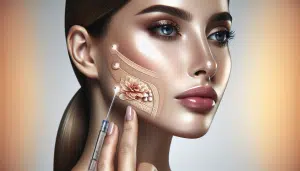Unlocking the Science of Collagen for Youthful Skin
Charlotte Stone September 26, 2025
Curious about how collagen supports glowing, youthful skin? This article unlocks the secrets behind collagen, exploring its benefits, how lifestyle can influence production, and which habits may help support skin health. Dive into facts, research, and proven tips to help you feel informed on this trending wellness topic.
Understanding Collagen and Its Powerful Role in Skin Health
Collagen is a crucial protein found abundantly throughout the body, responsible for providing structure and support to the skin, hair, nails, and connective tissues. For those seeking to maintain a youthful appearance, collagen is often at the center of many beauty routines. It acts like a scaffold, granting firmness and elasticity to the skin. Over time, natural collagen levels decline, contributing to visible signs of aging such as wrinkles and sagging. Understanding how collagen functions may help explain why it remains a buzzword in the wellness and beauty space, especially when looking to support radiant, supple skin. Research shows that collagen makes up about 75% of the skin’s dry weight, underlining its importance in overall skin health (https://www.ncbi.nlm.nih.gov/pmc/articles/PMC3583892/).
While collagen occurs naturally, its synthesis is influenced by factors like age, sun exposure, lifestyle choices, and genetics. Ultraviolet radiation from the sun is one of the biggest threats to collagen integrity, which is why sun protection is often recommended as part of a long-term skin health strategy. Smoking and poor nutrition can also impair collagen formation, potentially accelerating the visible aging process. Conversely, adopting daily habits that support cell renewal and provide adequate nutrients can positively affect collagen synthesis in the skin. A deeper dive into these triggers helps highlight the practical steps people can take to nurture their skin’s underlying support structure.
The growing popularity of collagen supplements also brings many questions to the surface—what works, what doesn’t, and what’s backed by evidence? Some individuals turn to hydrolyzed collagen peptides in powder or capsule form. These are broken down for better absorption and may complement a balanced diet. However, the effectiveness of these products can depend on several factors, and not all supplements are created equal. Clinical research continues to evaluate their role in achieving visible improvements in skin texture and resilience. Knowing the basics about collagen gives a grounded starting point for anyone seeking a natural glow.
Lifestyle Habits That Support Natural Collagen Production
Everyday choices play a significant part in the body’s ability to maintain healthy collagen levels. Nutrient-rich foods provide vital building blocks essential for collagen synthesis. Protein sources like fish, chicken, beans, eggs, and dairy offer amino acids, while vitamin C from fruits and vegetables acts as a cofactor in the production process. Adequate hydration is also key, as moisture helps preserve the skin’s plumpness and elasticity. Incorporating antioxidant-rich foods—such as berries, leafy greens, and nuts—can further help protect against oxidative stress, which may degrade collagen. These simple diet adjustments build a strong foundation for long-lasting skin health.
Beyond nutrition, certain daily practices can bolster collagen. Regular, moderate exercise encourages circulation, delivering more nutrients and oxygen to skin cells. Wearing sunscreen, even indoors, is another habit that can help block damaging ultraviolet rays and preserve the collagen already present in the skin. Avoiding excessive sugar and highly processed foods is also advised, as these can contribute to a process called glycation—where sugar molecules attach to collagen fibers and weaken them. Making conscious changes doesn’t need to feel overwhelming; small shifts may have a cumulative effect over time.
Collagen production does not operate in isolation. Sleep, stress management, and minimizing exposure to environmental toxins all play a role. During deep sleep, the body works to repair tissues and regenerate cells, including those involving collagen. Managing stress through relaxation techniques like meditation or yoga may help by reducing cortisol levels, which can otherwise inhibit collagen synthesis. While it’s impossible to control every element of the environment, focusing on easy-to-implement, evidence-based choices empowers a proactive approach to skin vitality at any age.
Nutritional Approaches and Key Supplements for Collagen Support
Attention to diet is fundamental to supporting the body’s collagen matrix. Foods containing vitamin C, zinc, copper, and antioxidants are especially beneficial. Citrus fruits such as oranges and grapefruits, along with leafy greens like spinach and kale, are widely recognized for their vitamin C content. This nutrient is vital for the hydroxylation of collagen molecules, an essential step for stable and strong collagen fibers. Shellfish and nuts deliver minerals needed for collagen cross-linking, while bone broth is a traditional source often praised for its natural collagen content. The synergy between different foods can help maximize the benefits of these nutrients, making variety an asset in any meal plan.
The supplement market offers a variety of collagen peptides and marine collagen products marketed as ways to enhance skin health, joint flexibility, and more. Research suggests that hydrolyzed collagen—broken down into smaller, more digestible peptides—may be absorbed through the intestinal wall and delivered to skin cells. A growing body of studies notes improvements in skin hydration, elasticity, and wrinkle depth among participants who incorporated these supplements into their routines (https://www.ncbi.nlm.nih.gov/pmc/articles/PMC6835901/). However, individual results can vary, and experts recommend integrating supplements alongside, not in place of, a balanced diet.
It’s helpful to look into factors such as dosage, product formulation, and timing when considering supplements. The bioavailability of collagen peptides may differ depending on the source (bovine, marine, or chicken), and some products add vitamin C or hyaluronic acid for extra support. Labels backed by third-party testing or certifications may provide additional quality assurance. While there is growing enthusiasm about collagen supplementation, maintaining a healthy skepticism and consulting with trusted health professionals ensures well-informed choices tailored to unique needs and goals.
The Impact of Age, Environment, and Genetics on Skin Vitality
Age plays a significant role in the body’s natural decline in collagen production, typically beginning in the mid-20s and accelerating with each passing decade. Fine lines, thinning skin, and decreased firmness are some of the visible changes tied to this gradual reduction. While it is not possible to halt the aging process, understanding how it influences the collagen network helps guide realistic expectations. People of all skin types can benefit from adopting proactive habits early, focusing on both protection and nourishment rather than aiming for reversal.
Genetics establish the blueprint for skin’s baseline resilience and collagen production capacity, but lifestyle and environmental exposures may alter the trajectory. Urban dwelling, frequent travel, and even climate may play a role, with pollution and other environmental stressors shown to affect the quality and organization of collagen fibers. Adopting air purification, regular cleansing, and the use of skincare products containing antioxidants are among strategies highlighted as ways to fight oxidative stress (https://www.ncbi.nlm.nih.gov/pmc/articles/PMC4989391/).
Although genes cannot be changed, evidence indicates that up to 80% of visible skin aging is influenced by external factors versus just intrinsic aging (https://www.ncbi.nlm.nih.gov/pmc/articles/PMC6721670/). Focusing on consistent self-care routines, minimizing environmental stress, and choosing gentle, science-backed skincare products can support the longevity of collagen and maintain a glowing appearance well into later years. This knowledge encourages a proactive rather than reactive approach.
Integrating Collagen Support Into Everyday Beauty Routines
The most effective strategies for collagen preservation are often the simplest to adopt. Gentle cleansing, regular moisturizing, and applying sunscreen form the foundation of any daily routine supporting skin structure and hydration. Products featuring peptides, retinoids, or vitamin C serums can further enhance collagen support when used regularly and as part of an overall skin wellness plan. While quick fixes are rare, consistency is the true ally of glowing, lasting skin health.
Dermatologists recommend layering topical products in a way that allows for maximum penetration and effect—starting with the lightest serums and ending with a broad-spectrum sunscreen during the day. Night routines may include richer moisturizers or targeted treatments containing ingredients shown to aid collagen turnover. For individuals interested in non-invasive cosmetic procedures, options such as microneedling or radiofrequency devices have been studied for their potential to stimulate collagen renewal (https://www.ncbi.nlm.nih.gov/pmc/articles/PMC6087057/), though these decisions are highly personal and best explored with a licensed professional.
More than a single supplement or facial serum, holistic routines that blend lifestyle, nutrition, and skincare cultivate resilience and vibrancy over time. Tracking progress, adjusting products based on season or life stage, and approaching skin wellness with patience support both appearance and confidence. Embracing the power of collagen becomes a sustainable, rewarding act of self-care and well-being.
Frequently Asked Questions and Misconceptions About Collagen
There are plenty of myths and misconceptions surrounding collagen. Some believe only topical products are effective, while others expect instant results from supplements. The truth is, collagen molecules are generally too large to penetrate the skin’s outer layer, meaning most topical products work indirectly—by nourishing the skin’s surface or spurring other components to stimulate collagen deeper within. Evidence supports that well-formulated oral supplements may contribute to measurable skin improvements, but timing and consistency are pivotal, and dramatic overnight changes are unlikely (https://ods.od.nih.gov/factsheets/DietarySupplements-Consumer/).
Another common misconception is that all forms of collagen are equal. Collagen can come from several sources: bovine, porcine, marine, and more. Each source offers small differences in amino acid composition, which can, in turn, influence absorption and outcome. Choosing products reviewed for quality and purity helps avoid ineffective or unsafe options. Still, no supplement or topical formula replaces the foundational habits—nutrition, sun protection, and gentle care—that are proven to make the biggest difference over time.
Curiosity about how to navigate the wide world of collagen is natural. By contrasting marketing claims with evidence-based guidance and credible expert opinion, it becomes easier to find balanced, practical pathways toward healthy, vibrant skin. Reliable information is the key to choosing routines, products, and strategies that truly suit individual needs—helping everyone benefit from the ongoing research and innovation in the world of beauty and wellness.
References
1. Uitto, J., & Bernstein, E. F. (2016). Role of collagen in skin aging. https://www.ncbi.nlm.nih.gov/pmc/articles/PMC3583892/
2. Lee, C. H., Singla, A., & Lee, Y. (2020). Hydrolized collagen and its benefits to human health. https://www.ncbi.nlm.nih.gov/pmc/articles/PMC6835901/
3. Vierkötter, A., Schikowski, T., Ranft, U., Sugiri, D., Matsui, M., Krämer, U., & Krutmann, J. (2010). Airborne particle exposure and extrinsic skin aging. https://www.ncbi.nlm.nih.gov/pmc/articles/PMC4989391/
4. Baumann, L. (2019). Skin aging and life style. https://www.ncbi.nlm.nih.gov/pmc/articles/PMC6721670/
5. Konda, S., & Swanson, N. A. (2018). Plasma skin regeneration technology for treating wrinkles: An evidence-based review. https://www.ncbi.nlm.nih.gov/pmc/articles/PMC6087057/
6. National Institutes of Health, Office of Dietary Supplements. (n.d.). Dietary Supplements Fact Sheet for Consumers. https://ods.od.nih.gov/factsheets/DietarySupplements-Consumer/







